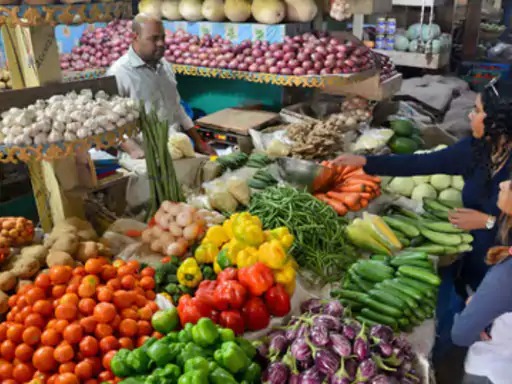
Retail inflation figures for the month of August will be released on Thursday at 5.30 pm. Experts are estimating that inflation may remain at 3.5%. Retail inflation had come down to 3.54% in the month of July. This was the lowest level of inflation in 59 months.
Food inflation rate had come down from 9.36% to 5.42% due to the fall in prices of grains, fruits, vegetables, pulses and spices. Urban inflation also came down from 4.39% to 2.98% on a month-on-month basis. Rural inflation came down from 5.66% to 4.10%.
Food inflation was 11.51% in July 2023, now it has come down to 5.42% Food items contribute about 50% to the inflation basket. Its inflation has come down from 9.36% to 5.42% on a month-on-month basis. Whereas a year ago in July 2023, food inflation was 11.51%. That is, it has also decreased on an annual basis.
The inflation rate of vegetables was 6.83% in July, while this rate was 29.32% in June. Cereals and pulses are an important part of India's staple diet. Their inflation has come down to 8.14% and 14.77%. Inflation of fuel and light has also come down.
RBI had kept its inflation forecast for this financial year at 4.5%. During the recent Monetary Policy Committee meeting, RBI had kept its inflation forecast for this financial year unchanged at 4.5%.
The RBI governor had said - Inflation is coming down, but the progress is slow and uneven. India's inflation and growth trajectory is moving in a balanced manner, but it is important to remain vigilant to ensure that inflation remains in line with the target.
How does inflation affect? Inflation is directly related to purchasing power. For example, if the inflation rate is 6%, then the value of Rs 100 earned will be only Rs 94. Therefore, one should invest keeping inflation in mind. Otherwise, the value of your money will decrease.
How does inflation increase or decrease? The increase and decrease of inflation depends on the demand and supply of the product. If people have more money, they will buy more things. Buying more things will increase the demand for things and if the supply is not according to the demand, the price of these things will increase.
In this way the market falls prey to inflation. In simple words, excessive flow of money in the market or shortage of things causes inflation. On the other hand, if the demand is less and the supply is more, then inflation will be less.
Inflation is determined by CPI. As a consumer, you and I buy goods from the retail market. The Consumer Price Index (CPI) shows the changes in the prices related to this. CPI measures the average price we pay for goods and services.
Apart from crude oil, commodity prices, manufactured cost, there are many other things which play an important role in determining the retail inflation rate. There are about 300 items on the basis of whose prices the retail inflation rate is decided.
--Advertisement--

 Share
Share



